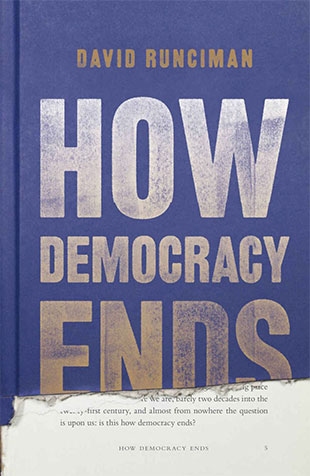According to David Runciman, professor of politics at Cambridge University and host of the widely acclaimed podcast "Talking Politics," American democracy is going through a mid-life crisis. The country seems unhinged with "an overheated political climate that appears increasingly unstable, riven with mistrust and mutual intolerance. fueled by wild accusations and online bullying, a dialogue of the deaf drowning each other out with noise."
Runciman explores in three large chunks of material factors that play a possible role in democracy's demise in the United States: (1) Coup! (2) Catastrophe! and (3) Technological Takeover! He sets the stage with commentary on Donald Trump's presidency describing him as "an old man with the political personality of a child." While pundits trample one another following up on conspiracy theories, the author probes the downfall of democracy in Greece, Egypt, and Turkey.
Populism has come alive in the United States but lacks the staying power that is necessary for deep and long-lasting political change. Citizens across the nation are frightened about the catastrophic consequences of nuclear calamity, climate change, and killer robots.
Another fear looming in the back of our consciousness is interesting to spiritual people who promote interconnection. Runciman posits: "We have a nagging feeling that our world has become vulnerable to collapse because everything is joined to everything else. If one thing fails, it could all fail. Global systems of finance, energy, communication, health and transportation are joined in ways that no none controls and no one fully understands."
Runciman does a fine job discussing The Circle, a 2013 novel by Dave Eggers (which was made into a movie) about the power of networks with global outreach. Think Facebook. He examines the impact of social media on politics, suggesting that democracy is more likely to succumb to technology than to tyrants.
Three cheers for David Runciman and his ambitious and astute overview of democracy in trouble. His analysis of its death rattle is supplemented by his search for alternatives in pragmatic authoritarianism (China), epistocracy (the rule of the knowers — see the excerpt), and liberated technology. The latter, he adds, is the most promising, offering "all sorts of potential futures: some wondrous, some terrible, and most wholly unknowable."
Runciman offers much food for thought. With luck, American democracy will survive its mid-life crisis, but, he concludes, "it is unlikely to be revived by it."
